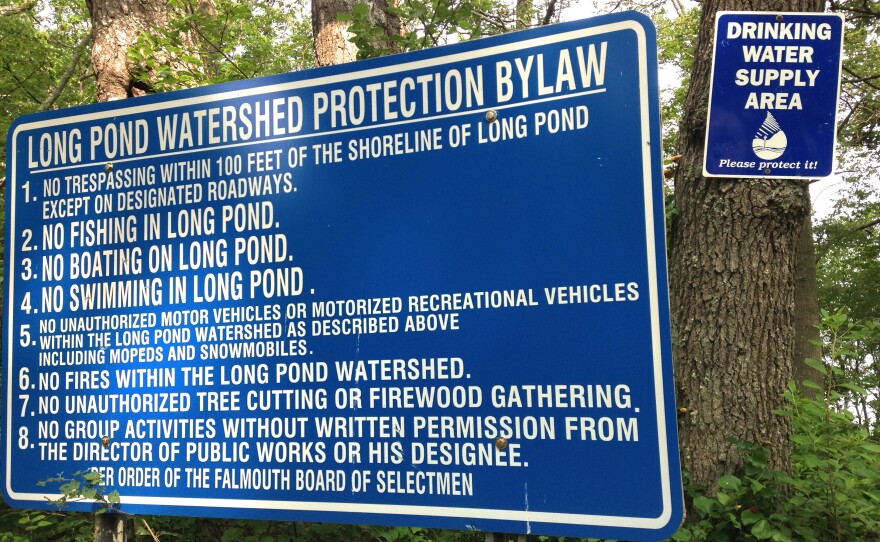Many Falmouth residents have long since gotten used to a musty after-taste in their tap water. Falmouth is one of only two communities in the state that lacks a filtration system for its drinking water supply, and that’s a concern for local health officials.
There’s some money on the way to get a system in place. But it’s not scheduled to go online until January, 2017. In the meantime, Falmouth relies on chlorination to keep its water potable, which sometimes causes problems.
The heart of Falmouth’s water system sits at the southern end of Long Pond, down a gravel road. The site has a large, round concrete water storage building. There are several other brick structures nearby, and one of them pumps water in from the pond to be disinfected with chlorine.
Raymond Jack is Falmouth Director of Public Works. He says chlorination has long been the only option for Long Pond, Falmouth’s main water source for the last 116 years.
The pond has no tributaries feeding or leaving it, so organic matter like decaying leaves and algae blooms have nowhere to go. The ideal way to address the problem is with a full-scale filtration system. Once in place, the system will remove the need for chlorination, and it should improve the water’s taste. But it won’t be ready for a few years. Meanwhile, Jack says chlorination produces disinfection byproducts.
“Trihalomethanes or haloacetic acids are the disinfection by-products that are monitored quarterly,” he said.
In the past, water quality would be determined by a yearly average of town-wide sampling results. But new rules imposed in 2012 require those averages be calculated for each individual site.
“If you have a problem at one site, under the previous set of regulations where one was consistently high, other ones that were lower would be able to reduce the overall average,” Jack explained. “But now, if that site is a problematic site, then it’s gonna stay high, and that can cause the town to go into violation.”
That’s what happened in September, 2013. The high numbers triggered a letter from the Board of Health to Falmouth healthcare professionals, warning that maternal exposure to disinfection byproducts may affect fetal growth, and may increase the risk for pre-term delivery. Jed Goldstone is the Board of Health Chairman.
“The water is safe for everybody to drink. The general public is fine. The concern is for pregnant women,” said Goldstone.
The board advises that pregnant women only drink Falmouth tap water through an activated carbon filter. Jean Talbert is an OB/GYN at Falmouth Hospital. She says the letter also suggests that pregnant women take shorter baths and showers.
“The levels actually are a little bit higher in steam, and so the exposure might be a little bit higher from that than actually from drinking the water,” said Talbert.
Talbert says she appreciates how the warnings have been handled by the Board of Health.
“The way it’s been presented, it’s been good. They didn’t set it out as ‘This is something we all need to panic about.’ It was mostly just, ‘Be aware,’” she said.
And Talbert says there are far more dangerous things a woman can do during pregnancy.
“Tobacco use, alcohol use, drugs. There’s many environmental risks that seem to be much more significant that, at this point, this risk in the Falmouth water supply,” Talbert said.
Falmouth officials have not alerted hotel, motel, B & B owners or restaurants about the town’s water problems, despite the thousands of tourists who visit Falmouth each summer. For her part, Talbert says she hasn’t seen any decrease in the pattern of birth weights since the letter was circulated last year. Meanwhile, Town Meeting voters in May approved funding for a 46-million dollar town-wide filtration system, which should be online by January, 2017. Board of Health Chairman Jed Goldstone is delighted.
“The drinking water filtration plant will just solve all of these problems,” he said.
That plant is still about 2-1/2 years away, leaving residents to use store-bought filters to improve the taste and purity of their tap water. For now, though, chlorination - with all its shortcomings - is still the order of the day for Falmouth’s water supply.






